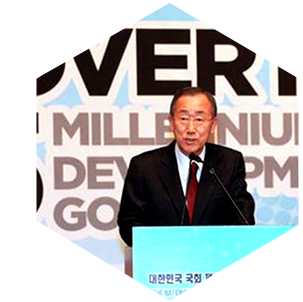
Overview of the Post-2015 Development Agenda
The Millennium Development Goals (MDGs) have been critical in mobilizing resources and driving real progress on some of the world’s most pressing problems over the past decade. With the MDG’s deadline set to conclude at the end of 2015, discussion over what should succeed the MDGs — known as the “Post-2015 Development Agenda”— is one of the most important and impactful conversations of this century.
The Post-2015 Development Agenda is an ambitious global vision that seeks to tackle extreme poverty, curb climate change, and put the world on a more prosperous and sustainable path by 2030. It includes the following four key components:
1. The Declaration – a vision statement of what we want to achieve in the next development agenda;
2. Goals and Targets – a new set of goals and targets to build on and succeed the MDGs;
3. Financing and the Means of Implementation – the “how” of delivering the Post-2015 Development Agenda; and
4. Monitoring and Review – defining a process to track progress on commitments made by all stakeholders.
The Post-2015 Development Agenda is currently being debated by UN member states and will be adopted by world leaders at a Special Summit in September 2015.
The UN Foundation’s Role

As part of the UN Foundation’s long-standing support to the UN, the UN Foundation is supporting the formulation of a bold, meaningful, and actionable Post-2015 Development Agenda that is broadly accepted and implemented. The UN Foundation does this through the following activities:
- Supporting the Secretary-General’s office and the UN system by convening forums for discussion and augmenting their capacity for outreach to key stakeholders. This includes connecting developing country think tanks, thought leaders, civil society, and private sector partners to the global dialogue.
- Serving as a resource by tracking and curating post-2015 conversations and analysis, including the dialogue in New York, online, and globally, and providing regular updates to interested partners.
- Convening informal meetings and workshops on thematic issues to foster constructive member state dialogue, including engaging the U.S. government and the Washington, DC policy community.
For the latest developments on Post-2015, follow us on Twitter @Post2015_UNF
